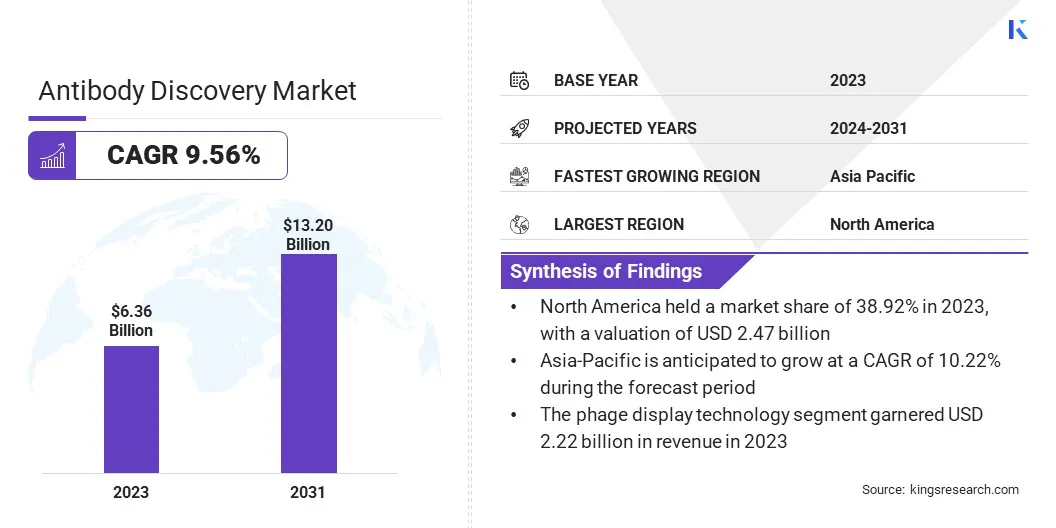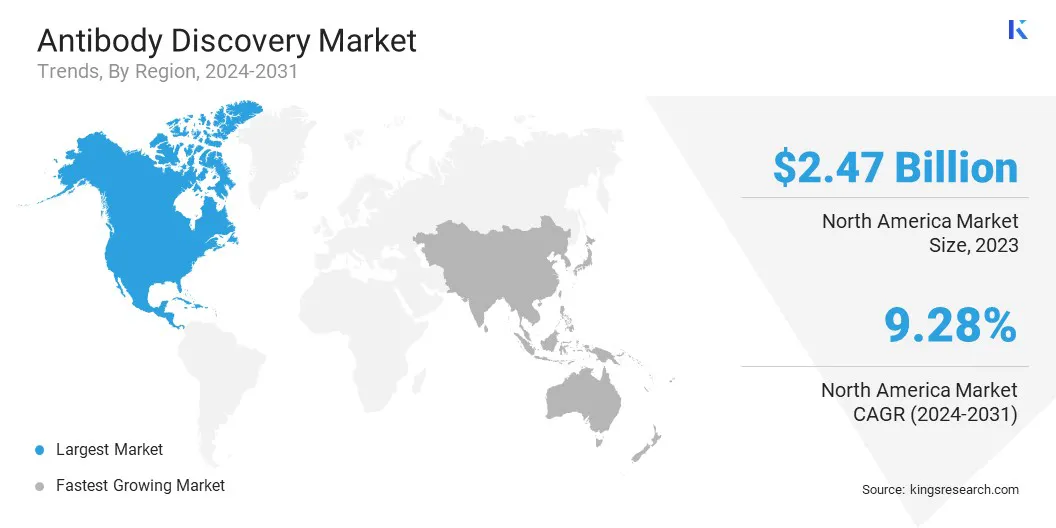Antibody Discovery Market Size
The global Antibody Discovery Market size was valued at USD 6.36 billion in 2023 and is projected to grow from USD 6.96 billion in 2024 to USD 13.20 billion by 2031, exhibiting a CAGR of 9.56% during the forecast period. The market is rapidly expanding due to increased demand for innovative immunotherapies and the development of new antibody-based treatments.
Advancements in screening techniques and the development of improved antibody platforms are accelerating the discovery process. Additionally, growing global healthcare investments and advancements in personalized medicine are fueling market growth by increasing the development of tailored therapeutic solutions.
In the scope of work, the report includes solutions offered by companies such as Eurofins Discovery, Evotec, Twist Bioscience, Genscript, Biocytogen, Sartorius AG, Danaher Corporation, Fairjourney Biologics S.A, Creative Biolabs, Charles River Laboratories, and others.
The antibody discovery market is experiencing robust growth, mainly due to the increasing demand for targeted therapies to treat chronic diseases such as cancer, autoimmune disorders, and infectious diseases. Technological advancements, including phage display, yeast display, and single-cell sequencing, have revolutionized the discovery process, making it faster and more cost-effective.
Additionally, growing advancements in antibody engineering are supporting market expansion, with the biopharmaceutical industry investing heavily in antibody research services. The rise in partnerships between academic institutions and industry players facilitates resource sharing and accelerates antibody discovery.
- For instance, since July 2023, AstraZeneca has been conducting an open-label, phase II study in collaboration with University Health Network (Toronto). This study aims to assess the efficacy of AZD2936 in clearing molecular residual disease (MRD) and improving outcomes in patients with high-risk locoregionally advanced head and neck squamous cell carcinoma (LA-HNSCC) following definitive treatment.
Significant investment in research and development, coupled with favorable regulatory approvals, is propelling market expansion and enhancing therapeutic outcomes.
Antibody discovery is the process of identifying and developing antibodies with specific binding affinity to target antigens, which can be used for therapeutic, diagnostic, or research purposes. This process involves several key steps: first, target identification, where disease-related antigens are selected; second antibody generation, which employs techniques such as immunization or synthetic libraries; third screening, to find antibodies with high specificity and affinity; and finally, optimization to enhance their therapeutic potential.
Advances in technology, such as high-throughput screening, phage display, and single-cell sequencing, have significantly improved the efficiency and accuracy of this process, enabling the development of novel antibodies for various medical applications.

Analyst’s Review
Research-based collaborations are significantly creating opportunities in the antibody discovery market. These partnerships are facilitating the development of innovative therapies through shared expertise and resources.
- For instance, in January 2023, Ono Pharmaceutical Co., Ltd. entered an option and research collaboration with Monash University. This partnership focuses on the discovery and development of antibodies targeting G protein-coupled receptors (GPCRs), with the aim of creating new treatments for inflammatory and autoimmune diseases.
- Additionally, in October 2023, F. Hoffmann-La Roche Ltd. signed a definitive agreement to acquire Televant. This agreement grants Roche the rights to manufacture, develop, and commercialize Televant's TL1A-directed antibody, RVT-3101, in both Japan and the U.S.
Collaborative efforts between industry and academic institutions are rapidly advancing antibody discovery and therapeutic innovation. Strategic acquisitions and partnerships are further expanding market reach and facilitating the development of novel antibody-based treatments.
Antibody Discovery Market Growth Factors
The rising incidence of chronic diseases such as cancer, autoimmune disorders, and infectious diseases is propelling the growth of the market. As these conditions continue to present substantial health challenges worldwide, there is an increasing demand for targeted therapies that offer improved efficacy and safety profiles compared to traditional treatments. This demand is resulting in extensive research and development activities, leading to the discovery of novel antibodies with enhanced specificity and potency.
Moreover, the market is experiencing rapid expansion as pharmaceutical and biotechnology companies invest heavily in developing and commercializing these advanced therapeutic antibodies. These efforts are aimed at addressing the unmet medical needs and improving patient outcomes. This dynamic landscape is fostering innovation and attracting significant investment, thereby stimulating market growth.
A significant challenge hampering the progress of the antibody discovery market is the high cost and complexity involved in developing and producing novel antibodies. The extensive research requirements, advanced technologies, and stringent regulatory hurdles contribute to substantial financial burdens and lengthy timelines.
To address these issues, key players are investing heavily in technological advancements and process optimizations, such as high-throughput screening and automation. These efforts, including partnerships and resource sharing, aim to enhance efficiency, reduce costs, and boost the development of innovative therapies, thereby augmenting market growth.
Antibody Discovery Market Trends
Breakthroughs in technologies such as phage display, yeast display, and single-cell sequencing are fueling the growth of the antibody discovery market. These innovations allow for the rapid and cost-effective identification and optimization of high-affinity antibodies. By streamlining the development process, these technologies reduce time-to-market and lower costs, making antibody therapies more accessible.
The enhanced efficiency and precision in discovering novel antibodies attract substantial investment from pharmaceutical and biotechnology companies. This increase in investment accelerates research and development efforts, leading to further advancements and a robust expansion of the market.
The growing emphasis on developing antibody drug conjugates, which combine the specificity of antibodies with the potency of cytotoxic payloads, is a key trend influencing the market. ADCs have demonstrated promising efficacy in treating various cancers by delivering targeted cytotoxic agents directly to malignant cells, thereby minimizing collateral damage to healthy tissues.
- For instance, in February 2023, Gilead Sciences, Inc. secured approval from the U.S. Food and Drug Administration (FDA) for Trodelvy (sacituzumab govitecan-hziy). This approval permits the use of Trodelvy for the treatment of adult patients with unresectable locally advanced or metastatic hormone receptor (HR)-positive, human epidermal growth factor receptor 2 (HER2)-negative breast cancer, who have previously undergone endocrine-based therapy and at least two other systemic treatments during the metastatic stage.
This precision-targeted approach is leading to improved therapeutic outcomes and fewer side effects, thereby generating substantial interest and investment in the research and development of ADCs. As regulatory approvals for ADCs increase, their market presence is expanding, underscoring the shift toward precision oncology therapies and contributing to robust market growth.
Segmentation Analysis
The global market is segmented based on technique, antibody type, end-user, and geography.
By Technique
Based on technique, the market is categorized into phage, display technology, single b cell immunization, hybridoma technology, next-generation sequencing, RT-PCR, flow cytometry, and fluorescence-activated cell sorting.
The phage, display technology led the antibody discovery market in 2023, reaching a valuation of USD 2.22 billion, mainly due to its capabilities in generating high-affinity antibodies and streamlining the discovery process. By utilizing bacteriophages to present peptides or proteins on their surface, this technology enables researchers to efficiently screen vast antibody libraries and accurately identify specific binders with high precision.
The technology's high-throughput screening potential accelerates the identification of promising candidates, thereby reducing both the time and costs associated with antibody development. Additionally, phage display facilitates the development of antibodies against challenging targets, including those that were previously considered undruggable.
Its versatility in generating both monoclonal and polyclonal antibodies further boosts its adoption. Phage display technology is significantly enhancing the efficiency and effectiveness of antibody discovery, thereby fueling segmental growth.
By Antibody Type
Based on antibody type, the market is categorized into humanized antibody, human antibody, chimeric antibody, and murine antibody. The humanized antibody segment captured the largest antibody discovery market share of 35.41% in 2023. This notable expansion is largely attributed to its advancements in creating antibodies with reduced immunogenicity and enhanced therapeutic efficacy.
Humanized antibodies, which are engineered to closely mimic human antibodies, minimize adverse immune responses and improve patient tolerability. This has led to their widespread use in treating chronic diseases such as cancer, autoimmune disorders, and infectious diseases.
The increasing focus on personalized medicine and precision therapies further increases the demand for humanized antibodies, as they offer targeted treatment options with fewer side effects. Additionally, technological advancements in antibody engineering and optimization are enhancing the development and production processes, making humanized antibodies more accessible and effective.
By End-User
Based on end-user, the market is categorized into pharmaceutical & biotechnology companies, and research & academic laboratories. The pharmaceutical & biotechnology companies segment is expected to garner the highest revenue of USD 9.50 billion by 2031.
These companies invest heavily in research and development to discover and develop novel antibody-based therapies, recognizing the potential of antibodies to address unmet medical needs and offer targeted treatments. Their substantial financial resources and expertise enable them to leverage advanced technologies, such as high-throughput screening and next-generation sequencing, to accelerate the discovery process.
Strategic partnerships, acquisitions, and collaborations with academic institutions and other industry players further enhance their capabilities. Additionally, their focus on personalized medicine and precision therapies is bolstering the growth of the segment.
Antibody Discovery Market Regional Analysis
Based on region, the global market is classified into North America, Europe, Asia-Pacific, MEA, and Latin America.

North America antibody discovery market share stood around 38.92% in 2023 in the global market, with a valuation of USD 2.47 billion. This prominence is largely due to significant advancements in infrastructure dedicated to antibody discovery.
- Notably, in June 2023, AbTherx introduced its Atlas Mice platform, a transgenic mouse-based system designed to enhance the process of antibody discovery. This innovative platform exemplifies the region's commitment to advancing antibody research through cutting-edge technology and infrastructure.
Additionally, the regional market benefits from a highly skilled workforce, state-of-the-art laboratories, and advanced technologies that foster innovation in antibody development. Moreover, favorable regulatory environments and substantial funding for research and development further strengthen its market position.
Asia-Pacific is anticipated to witness substantial growth at a robust CAGR of 10.22% over the forecast period. This growth is primarily fostered by innovative product launches and advancements in local biotechnology capabilities.
- For instance, in June 2023, Sanyou Biopharmaceuticals unveiled its Sanyou Super Trillion Common Light Chain Antibody Discovery Platform to facilitate the development of bispecific antibody formats.
This innovation underscores the region's increasing emphasis on advanced technologies and its crucial role in the global antibody discovery landscape. The expansion is further supported by a rising number of biopharmaceutical companies, increased R&D investments, and rising collaborations within the region.
Competitive Landscape
The global antibody discovery market report will provide valuable insight with an emphasis on the fragmented nature of the industry. Prominent players are focusing on several key business strategies such as partnerships, mergers and acquisitions, product innovations, and joint ventures to expand their product portfolio and increase their market shares across different regions.
Companies are implementing impactful strategic initiatives, such as expanding services, investing in research and development (R&D), establishing new service delivery centers, and optimizing their service delivery processes, which are likely to create new opportunities for market growth.
List of Key Companies in Antibody Discovery Market
- Eurofins Discovery
- Evotec
- Twist Bioscience
- Genscript
- Biocytogen
- Sartorius AG
- Danaher Corporation
- Fairjourney Biologics S.A
- Creative Biolabs
- Charles River Laboratories
Key Industry Development
- January 2023 (Collaboration): AbbVie Inc. formed a strategic collaboration with Imsmunome, Inc. to identify new target-antibody pairs using Immunome’s Discovery Engine.
The global antibody discovery market is segmented as:
By Technique
- Phage Display Technology
- Single B Cell Immunization
- Hybridoma Technology
- Next-generation Sequencing (NGS)
- RT-PCR
- Flow Cytometry
- Fluorescence-activated Cell Sorting (FACS)
By Antibody Type
- Humanized Antibody
- Human Antibody
- Chimeric Antibody
- Murine Antibody
By End User
- Pharmaceutical & Biotechnology Companies
- Research & Academic Laboratories
By Region
- North America
- Europe
- France
- U.K.
- Spain
- Germany
- Italy
- Russia
- Rest of Europe
- Asia-Pacific
- China
- Japan
- India
- South Korea
- Rest of Asia-Pacific
- Middle East & Africa
- GCC
- North Africa
- South Africa
- Rest of Middle East & Africa
- Latin America
- Brazil
- Argentina
- Rest of Latin America


